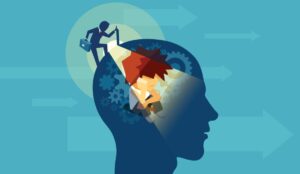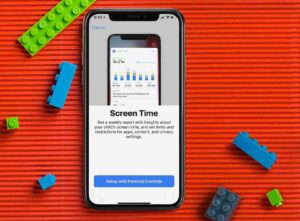Do you have trouble resisting temptation? Do you find yourself making decisions without thinking them through? If so, you may be struggling with impulsiveness. Impulsiveness is a common symptom of ADHD and can make everyday life very challenging. In this blog post, we will discuss what impulsive ADHD is, and how to deal with it. We will also provide helpful tips for managing impulsive behavior.
Contents
Understanding Impulsive ADHD
 Impulsive ADHD is described as “a pattern of behavior characterized by chronic, serious problems with impulsivity.” According to the National Institute of Mental Health, people with impulsive ADHD “have trouble waiting their turn, may act without thinking, and may interrupt others.” They may also have difficulty sustaining attention and controlling emotions.
Impulsive ADHD is described as “a pattern of behavior characterized by chronic, serious problems with impulsivity.” According to the National Institute of Mental Health, people with impulsive ADHD “have trouble waiting their turn, may act without thinking, and may interrupt others.” They may also have difficulty sustaining attention and controlling emotions.
While impulsivity is a common symptom of ADHD, it is not always indicative of the disorder. In fact, impulsivity is considered a “normal” part of childhood development. However, when impulsivity begins to interfere with daily functioning and relationships, it may be time to seek professional help.
Moreover, impulsive ADHD is not always easy to diagnose. Although many children with ADHD are impulsive, still impulsivity is not always a symptom of ADHD. If you are concerned that your child may have impulsive ADHD. It is important to speak with a qualified mental health professional.
Symptoms Of Impulsive ADHD
There are several symptoms of impulsive ADHD. Some of the common symptoms are:
- Acting without thinking
- Interrupting others
- Blurting out answers
- Having trouble waiting for a turn
- Being easily distracted
- Being impulsive
If you have ADHD, you may experience some or all of these symptoms. The severity of the symptoms can vary from person to person. Some people with ADHD may only have a few of the symptoms, while others may have all of them.
In fact, it is believed that as many as 60% of people with ADHD also have impulsivity issues. Moreover, impulsiveness can be a symptom of other conditions, such as anxiety and bipolar disorder. So, it can be difficult to diagnose impulsiveness on its own. However, if you have ADHD and are experiencing impulsivity, there are treatments that can help.
Causes Of Impulsive ADHD
 The causes of impulsive ADHD are not currently known. However, research suggests that impulsive ADHD may be caused by a combination of genetic and environmental factors.
The causes of impulsive ADHD are not currently known. However, research suggests that impulsive ADHD may be caused by a combination of genetic and environmental factors.
There is evidence to suggest that impulsive ADHD runs in families. This means that if someone in your family has the condition, you may be more likely to develop it yourself.
While the exact causes of impulsive ADHD are unknown, there are some risk factors that have been identified. These include:
- exposure to toxins, such as lead
- maternal smoking, alcohol use, or drug use during pregnancy
- low birth weight
- brain injury
These are just some of the possible risk factors for impulsive ADHD. It’s important to remember that having one or more of these does not necessarily mean that you will develop impulsive ADHD. In fact, most people who have these risk factors do not go on to develop the condition.
Still, you should consult with your doctor if you have any concerns about your risk of developing impulsive ADHD. They can help you to understand your individual risk and what steps you can take to prevent the condition.
Treatment Options
If you have impulsive ADHD, there are a few treatment options available to you. These include:
Psychotherapy
Therapies are conducted by a trained mental health professional and aim to help you understand. It is believed that understanding your condition can help you develop coping mechanisms to deal with it. Psychotherapy is often used in conjunction with medication. It helps in about 30-50% of cases by using types of therapies, such as:
Cognitive-behavioral therapy: This type of therapy helps you to understand the link between your thoughts, emotions, and behaviors. It can also teach you how to change negative thinking patterns and develop healthy coping mechanisms.
Interpersonal therapy: Interpersonal therapy focuses on your relationships with others and how ADHD affects these interactions. It can help you to communicate better and develop healthier relationships.
Other Therapies
There are other treatments available for those with impulsive ADHD. These include:
- Counseling: This can help to address any emotional issues that may be contributing to impulsiveness.
- Family therapy: It is important to involve the family in treatment, as they can provide support and understanding.
- Behavioral therapy: This can help to change the way a person with ADHD thinks and acts.
- Educational interventions: These are actually one of the most important treatments for ADHD, as they can help to address any learning difficulties that may be present.
Basically, these are different types of therapies that can help with impulsive ADHD. If you or someone you know has this condition, it is important to seek out treatment as soon as possible. Also, therapies are numerous and it’s often hard to find the right one. If you want to try online therapies, please contact Mantra Care, they will be able to help you.
Mantra Care is an online mental healthcare services provider. They offer a range of services, including counseling, therapy, and psychiatry. Contact and book your free consultation today to learn more about the services.
Medication
 There are a number of different types of medication that can be used to treat impulsive ADHD, including:
There are a number of different types of medication that can be used to treat impulsive ADHD, including:
Stimulants: These are the most commonly prescribed type of medication for ADHD. They work by increasing levels of dopamine and norepinephrine in the brain, which can help to improve focus and concentration.
Non-stimulants: These medications work by affecting other neurotransmitters in the brain, such as serotonin and norepinephrine. They are often used as an alternative to stimulants, or in cases where stimulants are not effective.
Antidepressants: These medications can be used to treat ADHD in people who also have depression or anxiety. They work by increasing levels of neurotransmitters such as serotonin and norepinephrine.
There are a number of different types of medication that can be used to treat impulsive ADHD, and the best type of medication for you will depend on your individual symptoms and needs. If you are considering medication for your impulsive ADHD, talk to your doctor about all of your options.
Support Groups
Support groups are available for people with ADHD and their families. They can provide valuable information, support, and coping strategies. There are also online support groups available. These can be a great way to connect with others who understand what you’re going through.
In fact, they can be so helpful that the American Psychiatric Association (APA) recommends them as part of treatment for ADHD. If you’re interested in finding a support group, talk to your doctor or therapist. They may be able to help you find one in your area. Or, you can search online for “ADHD support groups.”
So, these are some treatment options that you can consider if you have impulsive ADHD. Remember, treatment will be different for everyone. And, it’s important to work with a mental health professional to find what works best for you. They can help you create a personalized treatment plan.
Self-Help Tips To Deal With Impulsiveness
 Along with professional treatment, there are many things you can do to help control impulsiveness. Try these self-help tips:
Along with professional treatment, there are many things you can do to help control impulsiveness. Try these self-help tips:
Get organized
Put systems in place to help you remember things and stay on track. This may include keeping a daily planner, setting alarms on your phone, or using a reminder app. Keeping your things organized in daily routines can help you a way to avoid impulsive decisions.
Break tasks into smaller steps
Trying to do too much at once can be overwhelming and lead to impulsive decisions. Breaking tasks down into smaller, more manageable steps can help you stay on track. In fact, breaking tasks down into smaller steps can help you accomplish your goals in a more efficient way.
Create a support network
A support system is important in every aspect of life. When it comes to impulsiveness, finding a support network of friends or family members who understand your condition can be extremely helpful. These people can provide you with the understanding and encouragement you need to stay on track.
Get regular exercise
Exercise can help reduce stress and improve your mood. It’s also a great way to get rid of excess energy that can lead to impulsive decisions. Also, exercise is considered a natural treatment for ADHD as this activity helps to improve focus and concentration. More often, people with ADHD are impulsive due to hyperactivity, and exercise can be a great way to help burn off that extra energy.
Practice meditation
Meditation is a great way to calm the mind and body. It can help you focus and be in the moment, which can be helpful in reducing impulsiveness. In addition, meditation has been shown to have a number of other health benefits, such as reducing stress, anxiety, and depression.
Set limits on screen time
 Too much time spent on screens can lead to restlessness and impulsiveness. Setting limits on your screen time can help you stay focused and avoid making impulsive decisions. In fact, research has shown that too much screen time can worsen symptoms of ADHD. Because of this, it’s important to be mindful of your screen time and make sure you are spending enough time offline.
Too much time spent on screens can lead to restlessness and impulsiveness. Setting limits on your screen time can help you stay focused and avoid making impulsive decisions. In fact, research has shown that too much screen time can worsen symptoms of ADHD. Because of this, it’s important to be mindful of your screen time and make sure you are spending enough time offline.
Impulsiveness can be a challenge, but there are many things you can do to help control it. With the right support and self-help strategies, you can learn to manage your impulsiveness and live a happy, healthy life.
If you or someone you know is struggling with impulsiveness, contact a mental health professional for help.
Conclusion
To conclude, impulsive ADHD can be a difficult thing to deal with. However, there are ways to help lessen impulsiveness. By using techniques such as mindfulness and self-control, people with impulsive ADHD can learn to control their impulses and lead happier, more productive lives.
Moreover, it is important to understand that impulsive ADHD is actually a mental disorder. As such, it is important to seek professional help if you or someone you know is struggling with impulsiveness. With the right treatment, people with impulsive ADHD can learn to control their impulses and lead happy, fulfilling lives.
For more information, please contact MantraCare. ADHD is a neurodevelopmental disorder characterized by difficulty in paying attention, hyperactivity, and impulsivity. If you have any queries regarding Online ADHD Counseling experienced therapists at MantraCare can help: Book a trial ADHD therapy session


